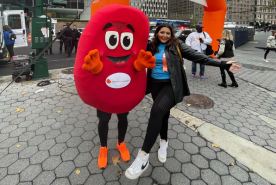Last Updated: December 06, 2024
Medically reviewed by NKF Patient Education Team
About SGLT2 Inhibitors
SGLT2 inhibitors are a type of oral (taken by mouth) prescription medicine commonly recommended for people with chronic kidney disease (CKD). They help keep your glomeruli (small filters in your kidneys) healthy and lower your urine albumin-creatinine ratio (uACR) level (a marker of kidney damage).
Most SGLT2 inhibitors have been shown in clinical trials to also help lower the risk of heart attack, stroke, and/or heart failure flare-ups. If you have type 2 diabetes, SGLT2 inhibitors can also help you manage your blood sugar levels.
Uses
Originally, SGLT2 inhibitors were developed to help people living with type 2 diabetes manage their blood glucose (sugar) levels. Later clinical trial data showed these medicines were also helpful for improving kidney and heart health for people with CKD and/or heart failure, even if they didn’t also have diabetes. These benefits are even stronger for people who also have albuminuria. SGLT2 inhibitors can also help people with other causes of CKD, including glomerular diseases like IgA nephropathy.
Some SGLT2 inhibitors are also FDA-approved to help manage blood sugar levels for children 10 years and older with type 2 diabetes. Studies are underway to see if SGLT2 inhibitors can be helpful for some kidney diseases in children who do not have diabetes.
How They Work
SGLT2 stands for “sodium-glucose co-transporter 2”. SGLT2 is like a control switch in your kidneys that helps keep glucose (sugar) and sodium (salt) in the body. Your body needs sugar for energy and sodium to prevent low blood pressure. So, SGLT2 tries to stop these items from leaving through your kidneys and urine. But too much of either can be a problem, leading to diabetes and high blood pressure.
So, SGLT2 inhibitors help your kidneys remove the extra glucose (sugar) and sodium (salt) from your body through the urine (pee) to keep a healthy balance in your blood.
- For people living with type 2 diabetes: helping your body remove extra sugar through your urine improves blood sugar levels.
- For people living with CKD (with or without diabetes): helping your body remove sugar and sodium through your urine also helps lower the pressure in your glomeruli (small filters in your kidneys). This helps keep your kidneys relaxed, which can help keep them healthy over the long-term.
SGLT2 inhibitors also improve heart health, although it is not fully known exactly how they do. The leading research suggests it is likely also related to the lowering of pressure in the kidneys (glomeruli).
The kidney benefits of SGLT2 inhibitors are separate from their ability to lower blood sugar levels. So, even people with CKD who do not have diabetes may benefit from taking an SGLT2 inhibitor.
Types
SGLT2 inhibitors have generic names that end in “-flozin”. FDA-approved medicines in the class include:
- bexagliflozin (Brenzavvy)
- canagliflozin (Invokana)
- dapagliflozin (Farxiga)
- empagliflozin (Jardiance)
- ertugliflozin (Steglatro)
All these medicines work in relatively the same way and are taken orally (by mouth) once a day.
Another medicine in this class is sotagliflozin (Inpefa). It is used in a slightly different way – to lower the risk of heart failure flare-ups and heart-related death in people with heart failure (or multiple risk factors for a heart failure flare-up). In addition to blocking SGLT2, it also blocks SGLT1 (which is mainly found in the small intestine) to lower the amount of sugar you absorb from food. Sotagliflozin is also taken orally (by mouth) once a day.
Effectiveness
SGLT2 inhibitors offer many health benefits including slowing the progression of CKD and lowering the risk of heart failure flare-ups and kidney failure. They also lower uACR levels for people with albuminuria.
For people living with type 2 diabetes, they also help improve blood glucose (sugar) and A1C levels. The effectiveness of SGLT2 inhibitors to lower blood sugar levels goes down as your estimated glomerular filtration rate (eGFR) goes down. However, the kidney and heart benefits remain, even in advanced stages of CKD. So, current guidelines recommend continuing to take these medications as long as they are not bothersome to you.
Some SGLT2 inhibitors have also been shown in clinical trials to lower the risk of dying from cardiovascular disease (heart attack or stroke) in people with CKD.
Questions for Your Healthcare Team
- Which side effects am I most likely to experience and how can I lower my risk?
- SGLT2 inhibitors are used for many different health conditions and the level of risk for each side effect depends on which condition(s) you have and other factors. Knowing your personal level of risk can help you know what to expect.
- Should any of my other medicines be changed or stopped when I start an SGLT2 inhibitor?
- Depending on your situation, other medicines used for diabetes, high blood pressure, and/or heart failure may need to be switched to a lower dose or stopped when starting an SGLT2 inhibitor.
- Should I temporarily stop taking my SGLT2 inhibitor before a planned surgery? If so, when should I stop it (and then when should I restart it)?
- SGLT2 inhibitors can increase the risk of ketoacidosis (high levels of acid in the blood) during surgery or prolonged fasting, especially in people with diabetes. Whether you need to stop taking your SGLT2 inhibitor before surgery depends on the type of surgery and your personal risk factors for ketoacidosis. When to stop the SGLT2 inhibitor will depend on which one you are taking.
- What should I do if I develop a urinary tract infection (UTI) or yeast infection while taking this medication?
- It is important to talk about your level of risk, know what to look for, and have a plan in place before something happens to help prevent any serious problems.





